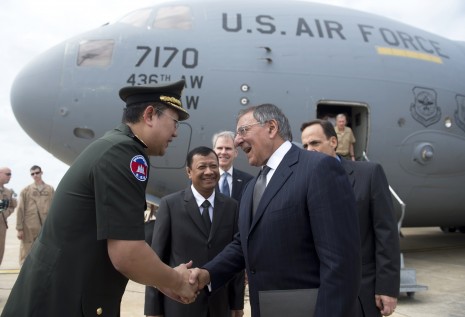The U.S. will address human rights abuses in Cambodia and urge Prime Minister Hun Sen to conduct free and fair elections and end a culture of land grabbing during President Barack Obama’s visit to Phnom Penh next week.
Samantha Power, senior director for Multilateral Affairs and Human Rights on the U.S.’ National Security Council, said that the U.S. is concerned by the “worrying direction,” in which Mr. Hun Sen appears to be moving with regards to human rights and next year’s national election.
“On Cambodia, just briefly, some of you may have already noticed that Hun Sen has actually, it looks like, sort of stepped up some of the infringements on civil society, and there’s been incidents of individuals who were making visual appeals to President Obama to do certain things with regard to calling for free and fair elections in the next election,” Ms. Power said, speaking from the White House on Thursday in a conference call with reporters.
“Right now, there’s no sign that those elections will be free and fair,” Ms. Power said.
“All I would say about our engagement with the Cambodians on a bilateral basis is that the thrust of the message…is on the importance of free and fair elections, the end of land seizures, the protection and promotion of human rights,” she said.
“That’s the core function of the engagement with Hun Sen. He is the [Asean] host, Cambodia is the host of these important summits and these diplomatic gatherings, but our message to him on a bilateral basis is very much about the human rights abuses that are being committed within Cambodia’s borders, and urging him once and for all to actually start to take these concerns seriously, rather than continuing to move in very worrying directions.”
Ms. Power is set to take part in two roundtable discussions on Tuesday in Phnom Penh, “one with trafficking advocates and survivors, because trafficking of course is an issue there and we’ve sought to strengthen the Cambodian government’s efforts in that regard with prosecutions and also supporting victim services and so forth.”
“And then the second roundtable will be a sort of human rights, political roundtable, women’s rights, and focusing on the election and the state of civil society, NGOs, and basically politics in Cambodia,” Ms. Power said.
“And so that’s an opportunity for one of the president’s top advisers to hear firsthand from Cambodians just what their concerns are, so that we may, again, inject those concerns at the highest levels of the bilateral relationship.”
Ms. Power’s statements amount to rare public criticism of Mr. Hun Sen, with whom Washington is courting in its announced “pivot” to the Asia-Pacific region to counter China’s growing influence. The tough words from Washington follow recent resolutions by the European Parliament and Australian Senate on the country’s worsening human rights situation and the need for credible elections in 2013. The most recent report by Surya Subedi, the U.N. special rapporteur on human rights in Cambodia, was scathing.
Amnesty International also called on Friday for visiting heads of state to press the Cambodian government on what it called a “deteriorating human rights situation.”
“The crisis over land continues, with forced evictions, land disputes and land grabbing affecting thousands of people and resulting in an increase in protests,” Amnesty said.
It added that freedom of expression is being stifled, particularly in the area of land disputes, which have seen protests and killings increase in number.
The Asean Civil Society Conference and Asean People’s Forum also issued a statement on Friday, calling for all member states of the bloc to “commit to periodic free and fair elections.”
Council of Ministers spokesman Phay Siphan said human rights were a “traditional issue” that crops up on a daily basis, because “everyone is concerned about human rights.”
“It’s good that they will have dialogue and it’s an opportunity for Obama to get good information,” Mr. Siphan said.
“Information can get twisted. It’s good they will get a face-to-face with each other so they can understand each other. My prime minister will share with him. He’s an open person.”
National Election Committee Secretary-General Tep Nytha dismissed Ms. Power’s remarks as being one-sided.
“I think it is just her point of view,” he said. “She will give a different judgment if she receives the correct information. Unfortunately, her forecast about the election environment for next year is just made on one-sided information, so it just sees the darkness.”
The White House announcement earned the plaudits of political analyst Lao Mong Hay and election monitor Koul Panha, who both said that such direct talk regarding the situation in Cambodia is long overdue.
Mr. Mong Hay said the U.S. appears to be responding directly to mounting pressure from human rights groups and politicians who have urged Washington to take a tougher stance on human rights issues in the region.
“Perhaps Cambodia has not much of a choice in this regard if the U.S. is very insistent. They have to accommodate Obama’s intervention,” Mr. Mong Hay said.
“It depends on the manner with which the president will be talking to our prime minister,” he added.
“I don’t think that [Mr. Hun Sen] will or can afford to be entirely negative to President Obama’s intervention. He cannot afford to say that this is intervening in the internal affairs of Cambodia, because we have an obligation under the [1991 Paris Peace] agreement.”
Mr. Panha, whose Committee for Free and Fair Elections in Cambodia has long pointed out shortcomings in how elections here are conducted, said he welcomed Washington’s concerns over the 2013 election.
“I appreciate this kind of attention and understanding of the Cambodian situation, especially before the coming election, as we are very concerned now,” he said.
(Additional reporting by Kuch Naren)




